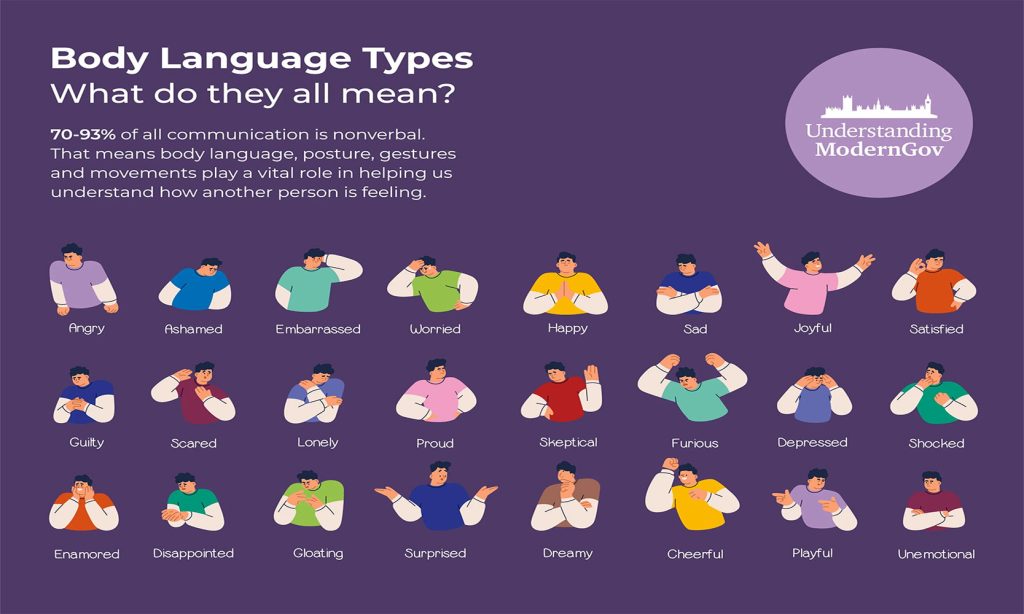How often do you think about your body language on the day-to-day?
Most of the time, our body language is unconscious. We move naturally in certain ways without even noticing.
This means we’re sending signals all the time, even if we’re unaware of them.
By being able to understand our own and other people’s body language signals, we can improve our communication on a wide scale.
In this post, we’ll cover exactly what body language is, why it’s important, how you can use your body language to your advantage and how to improve your body language for the workplace.

What is Body Language?
Body language is nonverbal communication that includes our posture, hand gestures and body movements.
We communicate through body language frequently in our daily lives, usually subconsciously.
It was Albert Mehrabian who theorised that nonverbal communication, such as tone of voice and facial expression collectively, make up 93% of all communication. Meaning spoken words make up just 7%!
This means that although we use our verbal communication (words) to share and speak our opinions, our body language will often communicate even more to our audience than we realise.
Some expert psychologists even say that body language can “reveal one’s true feelings.”
Body language is vital when we’re public speaking or presenting to a small or wide audience, here’s why.
Related: Why is Nonverbal Communication Important in the Workplace?
What is the Role of Body Language in Communication?
Body language enhances and amplifies the verbal message being portrayed through hand signals, gestures and postures. It helps us to convey emotions and intentions that may not be adequately expressed through words alone.
For example, a person shaking their head can convey disapproval, while someone nodding their head can convey understanding. This is just two very simple examples. Think of body language as an added bonus to any verbal conversation.
Why is Body Language Important in Communication?
Body language allows us to decode what a person is truly thinking or feeling without solely relying on their tone of voice and speech alone. It acts as an additional insight into unspoken emotions which can be crucial in the workplace.
We can use body language to give our words more impact and communicate more effectively.
Think about this example:
A speaker who gives off negative body language signals during their speech (turning their back to the audience or standing slouched), will be less likely to engage their audience and encourage them to listen to what they have to say.
This might sound harsh, but this is just how our human brains think.
Not only is this speaker losing the interest of their audience, but they’re also steering away the audience’s attention from the topic – no matter how important it is. No one wants this to happen.
3 Main Reasons Why Body Language is Important:
1. Understand the Feelings of Others
Being able to read body language means you can understand how another person is truly feeling using unspoken words and reactions.
Some body language types can be difficult to spot as they can happen fast, so you need to give your full attention to keep up and stay on the ball.
Read about common types of body language in communication so you can read anyone’s body language.
2. Show You’re Truly Engaged
Want to show someone you’re truly engaged in their conversation without actually saying it?
Use your body language.
If you’re speaking one-on-one with someone, open up your body language using good posture, maintaining eye contact, open hand gestures if having a discussion and a smile.
This means no crossed arms, hands on hips, harsh hand gestures or avoiding eye contact! Using disengaged body language might appear that you’re uninterested in what they have to say – even if you’re not.
Thinking about your body language when you’re actively listening will help you bond and develop relationships with anyone you speak to.
3. Demonstrate Your Confidence
Not everyone feels confident, especially if you feel uncomfortable under pressure or in front of groups of people.
But even the most visually confident people in the world have days where they don’t feel confident but still look it.
So how do they do it?
Using body language.
If you display confident body language, your audience is more likely to believe in your words and follow your lead.






